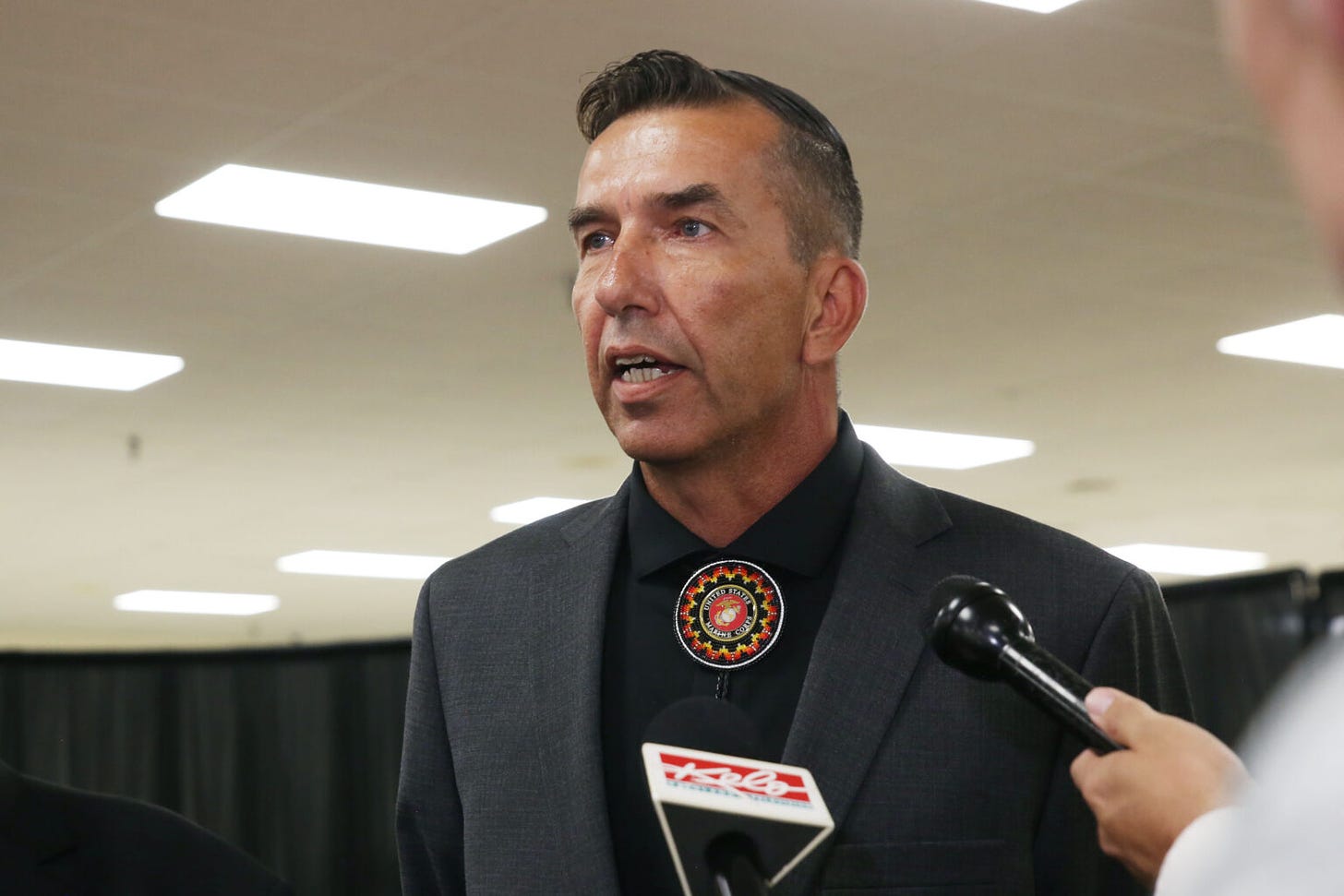Crow Creek Sioux Tribe expands public safety partnership with South Dakota Highway Patrol
By Makenzie Huber, South Dakota Searchlight

The Crow Creek Sioux Tribe has expanded state law enforcement’s ability to assist federal officers on the central South Dakota reservation, agreeing this month to a unique partnership between the state and a tribal nation.
The agreement allows the South Dakota Highway Patrol to respond to calls on the Crow Creek Reservation upon the tribe’s request, said Crow Creek Chairman Peter Lengkeek. The original agreement only allowed Highway Patrol to help with law enforcement over one weekend, for the tribe’s annual powwow, or “wacipi.”
Highway Patrol troopers will not “attempt to enforce or apply state laws” on the reservation while assisting tribal law enforcement, the agreement reads, but officers can assist with the enforcement of Crow Creek Sioux tribal law and federal law.
NEWS: Abandoned baby laid to rest, accompanied by police escort
Officers are not allowed to serve state warrants, Lengkeek said. He envisions troopers performing sobriety checks or saturation patrols when there’s a large event drawing people to the reservation.
“They’re not able to take that person into custody, because they can’t detain a tribal member,” Lengkeek said. “They can stand there and make sure the person doesn’t run off, but ultimately it’s tribal law enforcement that will make arrests.”
Although this is the only current law enforcement partnership of its kind between the state and a tribal nation, according to the state Department of Public Safety, there is precedent for cooperation at the county level. In 2022, the Oglala Sioux Tribe signed an agreement with the Pennington County Sheriff’s Office allowing the office to provide mutual aid when requested.
Partnership similar to Noem proposals but made without her involvement, tribal leader says
The amended agreement comes seven months after Gov. Kristi Noem gave a speech to lawmakers linking illegal U.S.-Mexico border crossings to alleged drug cartel activity on reservations. Lengkeek and other tribal leaders pushed back on the speech and Noem’s later comments suggesting that some tribal leaders are “personally benefiting” from a drug cartel presence on their lands. Representatives of all nine tribes in the state have since voted to ban Noem from their reservations.
RELATED: Crow Creek passes resolution banning Noem from central South Dakota reservation
Noem sent letters to all tribal leaders in February and March asking them to enter into a law enforcement agreement similar to the one Crow Creek has now signed, so South Dakota Highway Patrol officers could “assist in enforcing tribal law upon request” without encroaching on tribal sovereignty and jurisdiction.
Noem praised the new partnership.
“This mutual aid agreement recognizes the sovereignty of the tribe and ensures cooperation between tribal and state law enforcement officers to work together to uphold tribal law and help make their communities safer,” Noem told South Dakota Searchlight in a statement.
The amended agreement Lengkeek signed this month was something he began considering a year ago, he said, when he called a public safety state of emergency on the Crow Creek Reservation after the fatal shooting of a young man in 2023.
Crow Creek is one of the few South Dakota tribes that doesn’t operate its own police force with federal funding. Officers with the federal government’s Bureau of Indian Affairs (BIA) Office of Justice Services provide law enforcement services for Crow Creek and the neighboring Lower Brule Reservation. But Crow Creek leaders have argued that BIA officers aren’t always able to respond to calls in a timely fashion.
“It’s not adequate,” Lengkeek said. “We are undermanned, under-resourced, under-funded.”
Crow Creek worked to take public safety into its own hands after the shooting last year, including establishing security checkpoints at reservation entrances, creating a public safety task force, and carrying out a gun buyback program. The task force was disbanded earlier this year.
Lengkeek said he worked directly with the Highway Patrol on the new agreement and did not work with the governor.
“We handled this on our own,” Lengkeek said. “We don’t need the governor to do this.”
None of the eight other tribal nations within South Dakota have taken up Noem on her partnership agreement.
Tribal leaders, state hope to see success, more public safety partnerships
Lengkeek hopes the new agreement will continue even if tribal law enforcement becomes fully staffed. Tribal leaders from all nine nations attended a roundtable discussion this month with U.S. Attorney General Merrick Garland and Republican U.S. Sen. Mike Rounds, where they discussed inadequate federal funding for tribal law enforcement.
“I don’t foresee this relationship ever ending. Hopefully we’re able to strengthen it,” Lengkeek said. “I want my people not to be afraid anymore. That’s what I’m working toward.”
He also hopes the agreement can serve as a model of public safety partnership between the state and tribal nations. Noem agreed, saying she looks forward to “more tribes using this agreement as a model.”
NEWS: Sturgis Rally-generated taxes slide in 2024
Yankton Sioux Tribal Chairman Robert Flying Hawk said he is interested in an agreement similar to the Crow Creek-Highway Patrol partnership, whether it’s with the Highway Patrol or with other law enforcement agencies near the reservation.
Standing Rock Sioux Tribe Chairwoman Janet Alkire said all tribal leaders have to consult with tribal members before proceeding.
“None of us can make any decisions unless we take it to our people,” Alkire said. “It’s an ongoing education process for them to understand the exercise of true sovereignty and that we hold the key to that.”














